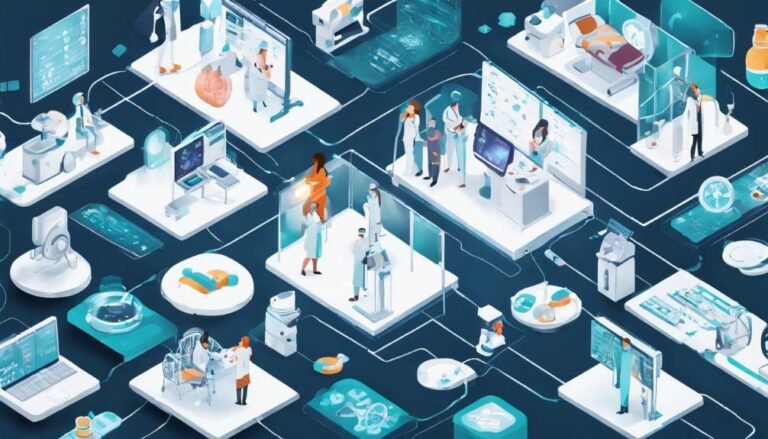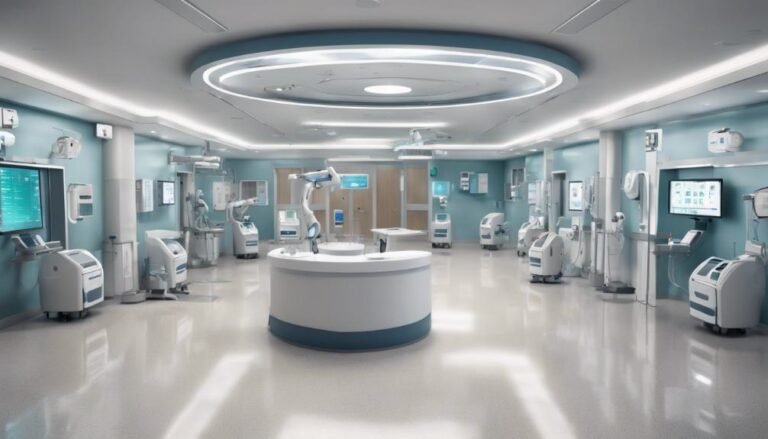AI in Healthcare Education: A Comprehensive Guide
Begin a journey where cutting-edge technology intersects with the domain of medical education. Explore how AI is transforming the way healthcare professionals learn and practice. Unveil the secrets behind personalized learning, immersive simulations, and AI-driven assessments that are molding the future of healthcare education. Stay tuned to delve into the ethical dilemmas and upcoming trends that will reshape the landscape of medical training.
Key Takeaways
- AI enhances medical curriculum with realistic simulations and personalized feedback.
- Personalized learning plans cater to individual needs and skill development.
- Virtual simulations engage learners in realistic scenarios with AI tutors.
- AI-powered assessment tools provide personalized feedback and streamline grading processes.
- Focus on AI-driven diagnostics, machine learning, and personalized study materials for efficient learning.
The Role of AI in Medical Curriculum
Incorporating artificial intelligence (AI) into medical curriculum enhances students' understanding of complex medical concepts through interactive simulations and personalized learning experiences. This curriculum enhancement is a direct result of AI integration in medical education, leveraging technology advancements to revolutionize the way students learn.
By utilizing AI-powered tools, medical schools can offer students realistic scenarios through simulations that mimic actual patient interactions, allowing for hands-on practice in a risk-free environment. Additionally, AI algorithms can analyze students' performance data to provide personalized feedback and tailor learning experiences to individual needs, fostering a more efficient and effective learning process.
Through AI integration, medical curriculum becomes dynamic and adaptive, catering to the diverse learning styles and paces of students. This approach not only increases engagement and retention but also ensures that students are well-prepared to tackle real-world medical challenges.
Embracing technology advancements in medical education through AI opens up a world of possibilities for creating a more interactive, personalized, and impactful learning environment.
Personalized Learning With AI
With personalized learning powered by AI in healthcare education, you can benefit from customized study plans tailored to your individual needs.
Adaptive tutoring techniques guarantee that you receive targeted support and guidance, enhancing your learning experience.
This innovative approach also allows for tailored skill development, optimizing your educational journey in the medical field.
Customized Study Plans
Tailored to your unique learning needs, AI in healthcare education crafts customized study plans that maximize your understanding and retention of essential concepts. By analyzing your performance data and learning patterns, AI algorithms can identify areas where you excel and pinpoint topics that require more focus. This personalized approach enhances study efficiency by directing your attention to the most relevant materials, ultimately boosting student engagement.
These customized study plans are designed to improve learning outcomes and enhance educational effectiveness. Through adaptive technologies, AI can adjust the difficulty of the material based on your progress, ensuring that you're consistently challenged at an appropriate level. Additionally, the interactive nature of these tailored plans keeps you actively engaged in the learning process, promoting better information retention and application of knowledge in real-world healthcare scenarios.
Adaptive Tutoring Techniques
Crafting a seamless learning experience, AI in healthcare education employs adaptive tutoring techniques that dynamically adjust to your progress and performance, tailoring instruction to your individual learning style and pace. Through interactive learning, AI systems can provide personalized educational experiences by analyzing your responses in real-time. These systems use algorithms to identify patterns in your learning behavior, enabling them to offer intelligent feedback and guidance that cater to your specific needs.
As you engage with AI-powered adaptive tutoring, the system continually refines its approach based on your strengths and areas that require improvement. This personalized learning journey enhances comprehension and retention by focusing on the concepts you find challenging while reinforcing those you grasp quickly.
Tailored Skill Development
Utilizing AI technology in healthcare education allows for the personalized development of skills tailored to your individual learning needs and preferences. With individualized training, innovative techniques are employed to enhance your understanding and competency in various healthcare domains.
Personalized learning through advanced technology enables a customized educational experience that adapts to your pace and style of learning.
AI-driven platforms can analyze your strengths and weaknesses, creating a tailored curriculum that focuses on areas requiring improvement while reinforcing your existing skills. These systems offer interactive simulations and real-world scenarios to provide hands-on experience, promoting active learning and retention of knowledge.
By incorporating machine learning algorithms, AI can adapt its teaching methods based on your performance, ensuring efficient skill development.
Through the integration of AI in healthcare education, you can benefit from a dynamic and personalized learning environment that caters to your specific educational requirements. This innovative approach revolutionizes traditional teaching methods, empowering you to acquire essential skills effectively and efficiently in the ever-evolving healthcare landscape.
Virtual Simulations and AI
Incorporating virtual simulations with AI technology enhances the experiential learning process in healthcare education.
Virtual patients offer a dynamic platform for interactive learning, allowing you to engage in realistic scenarios without putting real patients at risk.
AI tutors within educational simulations can provide personalized feedback, guiding you through complex medical procedures and decision-making processes.
These AI-driven tools adapt to your learning pace and style, ensuring a tailored educational experience that meets your specific needs.
AI-Powered Assessment Tools
You'll explore how AI-powered assessment tools are revolutionizing healthcare education by offering personalized feedback and adaptive learning experiences. These tools not only enhance student engagement but also provide educators with valuable insights into individual learning progress.
The impact of AI assessments on learning outcomes and knowledge retention will be a focal point in this discussion.
Benefits of AI Assessments
Harnessing the power of AI in healthcare education allows for more accurate and efficient assessments through the utilization of AI-powered assessment tools. These tools offer a range of benefits that enhance the learning experience for both educators and students.
By leveraging AI-driven performance analytics, educators can gain valuable insights into individual student progress, enabling personalized feedback and targeted interventions to support learning outcomes.
AI assessments also promote student engagement by offering interactive and adaptive learning experiences tailored to each student's needs. Through continuous data-driven insights, educators can identify areas where students may be struggling and provide timely support, ultimately improving overall learning outcomes.
Furthermore, AI assessments enable educators to streamline the grading process, saving time and allowing for more in-depth analysis of student performance trends. This detailed analysis not only benefits the individual student but also helps educators refine their teaching strategies for future cohorts.
Impact on Learning
In addition to utilizing AI-powered assessment tools in healthcare education, educators can greatly impact learning outcomes by providing personalized feedback and targeted interventions based on individual student progress. These tools offer cognitive enhancement by adapting to each student's learning style, fostering deeper understanding of complex medical concepts.
Student engagement is also heightened as AI assessments can create interactive learning experiences, keeping learners motivated and interested in their studies.
Furthermore, AI-powered assessment tools improve learning efficiency by automating the grading process, allowing educators to focus on providing quality instruction rather than spending excessive time on evaluations. This streamlined approach enables students to receive prompt feedback, enhancing their comprehension and retention of key information.
Additionally, the personalized nature of AI assessments tailors learning experiences to individual needs, leading to enhanced knowledge retention and a more effective educational journey in healthcare.
Enhancing Clinical Decision-Making
Improving clinical decision-making through the integration of AI technology has shown significant potential to enhance the quality and accuracy of patient care in healthcare education. By utilizing advanced data analysis techniques, AI systems can process vast amounts of patient data rapidly and accurately, providing healthcare practitioners with valuable insights to support their clinical decisions.
Through predictive modeling, AI algorithms can forecast potential outcomes based on historical data, helping clinicians anticipate complications or tailor personalized treatment plans for patients. These predictive capabilities not only aid in early detection and prevention of diseases but also optimize treatment strategies for better patient outcomes.
AI technology enhances clinical decision-making by offering evidence-based recommendations derived from thorough data analysis. It assists healthcare professionals in interpreting complex medical information, identifying patterns, and making informed decisions swiftly.
AI in Continuing Medical Education
AI technology in continuing medical education revolutionizes the way healthcare professionals engage with advancements in clinical practice and knowledge. Interactive modules powered by AI offer personalized learning experiences tailored to individual needs. AI tutors provide real-time feedback, guiding professionals through complex medical scenarios and guaranteeing a deep understanding of the material. These AI-driven platforms promote active learning, allowing users to apply knowledge in simulated environments and receive immediate insights.
One of the significant advantages of AI in continuing medical education is its capability for continuous improvement. By analyzing user interactions and performance data, AI systems can adapt and enhance the learning experience over time. This adaptive learning approach ensures that healthcare professionals receive the most relevant and up-to-date information, enabling them to stay at the forefront of medical advancements.
Incorporating AI into continuing medical education not only enhances knowledge retention but also fosters critical thinking and problem-solving skills. The integration of AI technology in this field marks a paradigm shift towards more efficient, engaging, and effective lifelong learning opportunities for healthcare professionals.
Ethical Considerations in AI Education
Exploring the ethical implications of integrating artificial intelligence into healthcare education reveals complexities that necessitate careful consideration and proactive measures to address potential challenges and maintain ethical standards. Privacy concerns arise due to the sensitive nature of healthcare data processed by AI systems. It's essential to guarantee that patient information is securely handled to uphold confidentiality.
Bias detection is another critical aspect to address, as AI algorithms can inadvertently perpetuate existing biases present in healthcare, potentially leading to unfair treatment or inaccurate diagnoses. Transparency is key in AI education to build trust among stakeholders. Educators must disclose the use of AI tools, how decisions are made, and the limitations of AI systems.
Accountability mechanisms should be put in place to oversee the ethical implementation of AI in healthcare education. This involves establishing clear guidelines, monitoring systems for ethical compliance, and holding individuals responsible for any misuse of AI technology. By addressing privacy concerns, bias detection, ensuring transparency, and implementing accountability measures, the integration of AI in healthcare education can be conducted ethically and responsibly.
Future Trends in AI Integration
With the rapid advancement of technology in healthcare, the integration of artificial intelligence is poised to revolutionize the way medical education is delivered and accessed.
Future trends in AI integration are set to heavily focus on AI-driven diagnostics and machine learning applications. AI-driven diagnostics will enable educators to provide students with real-time analysis of medical cases, allowing for a more interactive and engaging learning experience. This technology won't only enhance diagnostic skills but also guarantee that students are exposed to a wide range of cases and scenarios, preparing them for real-world challenges in healthcare settings.
Machine learning applications will play a vital role in personalizing education by tailoring learning paths to individual student needs. Adaptive learning platforms powered by machine learning algorithms will track student progress, identify areas for improvement, and suggest personalized study materials. This level of customization will enhance the efficiency and effectiveness of medical education, ensuring that students receive tailored support throughout their learning journey.
Conclusion
You've just scratched the surface of the incredible impact AI is having on healthcare education. With personalized learning plans, realistic simulations, and AI-powered assessment tools, the future of medical training is brighter than ever.
Prepare yourself for a revolution in learning that will catapult you into a whole new domain of knowledge and expertise. Embrace AI in healthcare education and watch your potential soar to unimaginable heights.
The future is here, and it's powered by AI.







